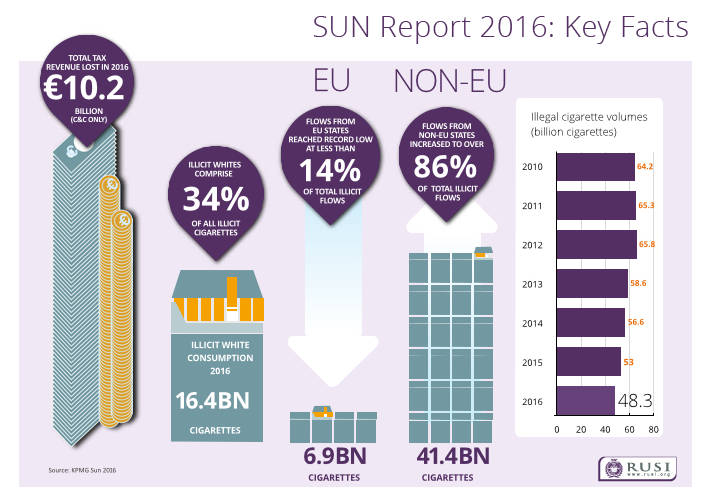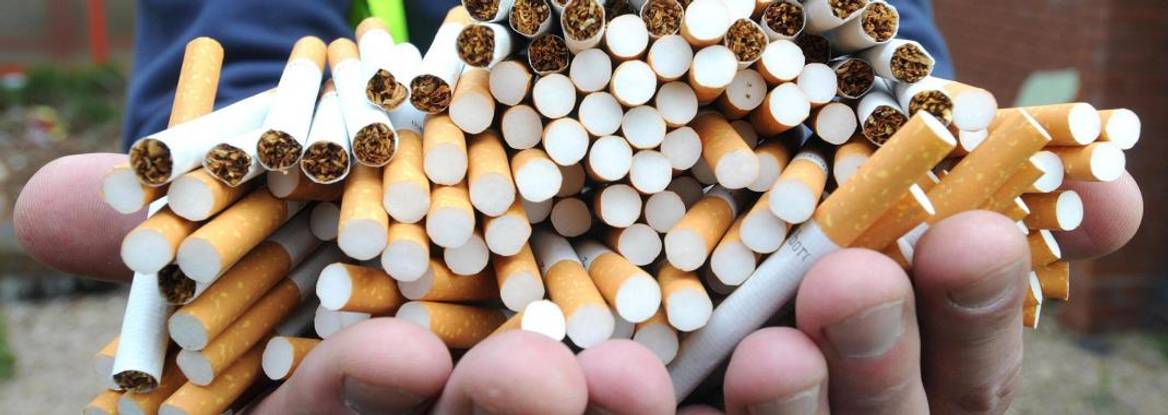Project SUN: A Study of the Illicit Cigarette Market in the European Union, Norway and Switzerland
This study investigates the scale of the illicit cigarette trade in the EU, Norway and Switzerland. Commissioned by RUSI with the quantitative data supplied by KPMG through their annual Project SUN report, this year, for the first time, RUSI has provided additional qualitative research, bringing a new dimension to the study.
Download this publication
This study reveals that over 9% of all cigarettes consumed in Europe in 2016 were illegal. Amounting to 48 billion cigarettes, these represent more than the total volume purchased legally in France, costing governments as much as €10.2 billion in lost tax revenues.
Despite the sustained threat, the report also shows that efforts by law enforcement contributed to an overall decline in the consumption of illegal cigarettes in Europe, from 9.8% of total consumption in 2015 to 9.1% in 2016. Additionally, ‘positive macroeconomic factors and a stable pricing environment' have contributed to reducing demand for illicit products.
Key insights of the report:
- 48.3 billion counterfeit and contraband cigarettes were consumed in Europe in 2016, depriving governments of as much as €10.2 billion in lost tax revenues.
- Illicit consumption declined by 8.9% between 2015 and 2016, the largest single-year drop in 3 years.
- Ukraine replaced Belarus as the largest single source of illicit cigarettes, accounting for 12% of total counterfeit and contraband flows.
- Five countries (France, Poland, UK, Germany and Italy) accounted for over 62% of all illegal consumption in Europe.
- Ongoing work by law enforcement and tighter border controls have contributed to reducing the supply of illegal cigarettes into the EU.

The independent study was commissioned by RUSI with the quantitative data supplied by KPMG through their annual Project SUN report, which investigates the scale of the illicit cigarette trade in the EU, Norway and Switzerland. This year, for the first time, RUSI has provided additional qualitative research, bringing a new dimension to the study. RUSI received funding for the study from British American Tobacco, Imperial Tobacco and Philip Morris International.
The additional qualitative research from RUSI reveals how organised crime groups engaged in the illicit cigarette trade face considerably lower risks compared to other forms of crime. Across Europe, law enforcement has typically focused on more visible criminal activity – particularly drug trafficking – which is perceived to pose a more immediate threat. Meanwhile, the profits to be made can be just as significant as those attached to higher-risk crime. With low production costs, illicit cigarettes are lightweight and easy to transport, yet retain a high sale value and consistent consumer demand.
Report Methodology
Following an established and rigorous quantitative methodology, KPMG conducted a range of statistical analyses for each of the countries studied. These examine the prevalence of illicit cigarette consumption in each country, the origins of non-domestic inflows, the destinations of outflows, as well as the main brands involved.
This year, RUSI has provided analysis on the organised crime dynamics underpinning the trends revealed by the data. The research draws on interviews with law enforcement, industry and academic experts, as well as operational fieldwork in five countries – Greece, Italy, Poland, Romania and Spain.
Combining these methodologies has enabled RUSI to provide additional context to the trends revealed by the quantitative analysis, highlighting the organised crime practices underpinning the data. When considered together, the findings offer detailed insight into the true scale and nature of the illicit cigarette market across Europe, as well as the wider organised crime dynamics fueling this trade. A clear understanding of these issues is crucial to inform the development of effective responses.

